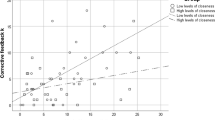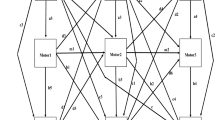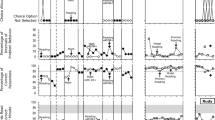Abstract
The purpose of this study was to investigate the effects of teacher verbalizations on the correct task performance of autistic children when positive reinforcement was presented in a noncontingent fixed-time schedule. Individual sessions were conducted using easy and difficult tasks with two autistic children. A within-subjects A- B- A- B withdrawal design was used. The results indicate that teacher verbalizations produced increases in the percentage of correct responding on difficult and easy tasks. This finding is discussed in terms of negative reinforcement and demand characteristics. The educational implications are also presented.
Similar content being viewed by others
References
Dunlap, G., & Koegel, R. Motivating autistic children through stimulus variation.Journal of Applied Behavior Analysis, 1980,13, 619–627.
Egel, A. Reinforcer variations: Implications for motivating developmentally disabled children.Journal of Applied Behavior Analysis, 1981,14, 345–350.
Ferrari, M., & Harris, S. L. The limits and motivating potential of sensory stimuli as reinforcers for autistic children.Journal of Applied Behavior Analysis, 1981,14, 339–343.
Hersen, M., & Barlow, D. H.Single case experimental designs: Strategies for studying behavior change. New York: Pergamon Press, 1976.
Hung, D. Using self-stimulation as reinforcement for autistic children.Journal of Autism and Childhood Schizophrenia, 1978,8, 355–366.
Hier, J., & Harris, S. L. Self-stimulation and learning in autistic children: Physical or functional incompatibility?Journal of Applied Behavior Analysis, 1977,10, 311. (Abstract).
Koegel, R., & Covert, A. The relationship of self-stimulation to learning in autistic children.Journal of Applied Behavior Analysis, 1972,5, 381–387.
Koegel, R., & Egel, A. Motivating autistic children.Journal of Abnormal Psychology, 1979,85, 418–426.
Koegel, R., & Rincover, A. Research on the difference between generalization and maintenance in extra-therapy settings.Journal of Applied Behavior Analysis, 1977,10, 1–12.
Koegel, R., Firestone, P., Kramme, K., & Dunlap, G. Increasing spontaneous play by suppressing self-stimulation in autistic children.Journal of Applied Behavior Analysis, 1974,7, 521–528.
Koegel, R., Dunlap, G., & Dyer, K. Intertrial interval duration and learning in autistic children.Journal of Applied Behavior Analysis, 1980,13, 91–99.
Krug, D., Arick, J., & Almand, P.Autism Screening Instrument for Educational Planning. Portland, Oregon: ASIEP Educational Co., 1980.
Mithaug, D. E. A comparison of procedures to increase responding in three severely retarded, noncompliant young adults.AAESPH Review, 1979,4, 66–80.
Neel, R. S. Autism: Symptoms in search of a syndrome. In F. Wood & K. Lakin (Eds.),Disturbing, disturbance, or disturbed, perspectives on definition of problem behaviors in educational settings. Minneapolis: Department of Psychoeducational Studies, University of Minnesota, 1979.
Rutter, M., & Schopler, E.Autism: A reappraisal of concepts and treatment. New York: Plenum Press, 1978.
Schreibman, L. Effects of within-stimulus and extra-stimulus prompting on discrimination learning in autistic children.Journal of Applied Behavior Analysis, 1975,8, 91–115.
Williams, J., Koegel, R., & Egel, A. Response-reinforcer relationships and improved learning in autistic children.Journal of Applied Behavior Analysis, 1981,14, 53–60.
Wolery, M. Self-stimulatory behavior as a basis for devising reinforcers.AAESPH Review, 1978,3, 23–29.
Wolf, M. Social validity: The case for subjective measurement or how applied behavior analysis is finding its heart.Journal of Applied Behavior Analysis, 1978,11, 203–214.
Author information
Authors and Affiliations
Additional information
The authors are grateful to the children, parents, and staff of the Experimental Education Unit of the University of Washington, Seattle, who made this study possible.
Rights and permissions
About this article
Cite this article
Hughes, V., Wolery, M.R. & Neel, R.S. Teacher verbalizations and task performance with autistic children. J Autism Dev Disord 13, 305–316 (1983). https://doi.org/10.1007/BF01531568
Issue Date:
DOI: https://doi.org/10.1007/BF01531568




